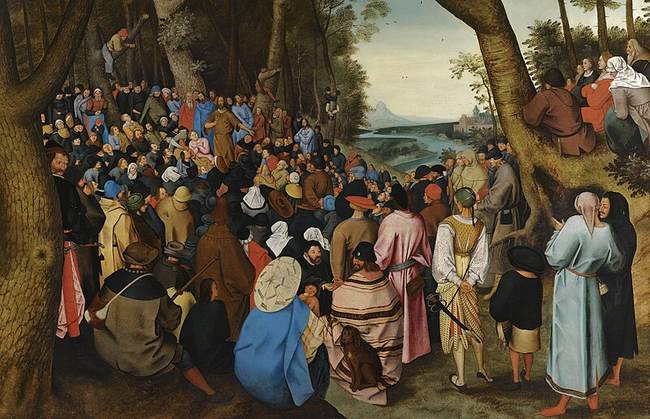We support our Publishers and Content Creators. You can view this story on their website by CLICKING HERE.

This morning’s Gospel reading is Luke 3:10–18:
The crowds asked John the Baptist,
“What should we do?” He said to them in reply, “Whoever has two cloaks should share with the person who has none. And whoever has food should do likewise.” Even tax collectors came to be baptized and they said to him, “Teacher, what should we do?” He answered them, “Stop collecting more than what is prescribed.” Soldiers also asked him, “And what is it that we should do?” He told them, “Do not practice extortion, do not falsely accuse anyone, and be satisfied with your wages.”
Now the people were filled with expectation, and all were asking in their hearts whether John might be the Christ. John answered them all, saying, “I am baptizing you with water, but one mightier than I is coming. I am not worthy to loosen the thongs of his sandals. He will baptize you with the Holy Spirit and fire. His winnowing fan is in his hand to clear his threshing floor and to gather the wheat into his barn, but the chaff he will burn with unquenchable fire.” Exhorting them in many other ways, he preached good news to the people.
Advertisement
My rule in life can be summed up thusly: When all else fails, read the directions. For some reason, that is my very last option in almost every case. It matters little that previous attempts to free-lance on procedures and processes result in some level of failure.
For instance: When I was a much younger man, I’d do my own brake-pad replacements and would always have a part or two left over that I didn’t recognize. Oh, the car still worked and the brakes accomplished their tasks, but … I always wondered what those little doohickeys actually did. I am fortunate to have never learned that answer the hard way. These days, I leave those tasks to the professionals, and I bet everyone who drives with me on the road is very appreciative of that decision.
My father, on the other hand, was a stickler for procedure. With every car he bought, Dad would buy the Chilton manual for it, with the exploded diagrams and the careful procedures for all maintenance tasks. He recognized the importance and wisdom of reading and abiding by the instructions.
This comes to mind in today’s Advent readings, because I not only hear the voice of the Father in it, but my dad as well. To the crowd that asks John the Baptist “what should we do?,” I hear my dad say … “Well, did you read the directions?”
To the tax collectors, the Baptist repeats the Eighth Commandment: You shall not steal. Arguably, his response also covers the Tenth Commandment (You shall not covet …). To the soldiers, John again refers to the Eighth and Tenth commandments, along with the Ninth Commandment prescription against bearing false witness.
Advertisement
John’s first point may be more subtle, but it still restates the tenets of faith in the Lord. The books of Exodus and Leviticus repeatedly emphasize the need to share among the community so that the poor may have dignity and standing. Indeed, in Deuteronomy 15:4-6, the Lord tells the Israelites that there would be no poor as long as they lived according to His word:
But there will be no poor among you (for the LORD will bless you in the land which the LORD your God gives you for an inheritance to possess), if only you will obey the voice of the LORD your God, being careful to do all this commandment which I command you this day. For the LORD your God will bless you, as he promised you, and you shall lend to many nations, but you shall not borrow; and you shall rule over many nations, but they shall not rule over you.
In all of these responses, John the Baptist preaches more than he prophesies, although the latter part of today’s passage is clearly a prophecy in the context of the moment. He isn’t teaching anything new in the answers to their questions; John is calling the people back to the Word of God, in preparation for the Word to emerge in Jesus’ public ministry. John wants to warn the people to prepare for this as the time is nearly at hand to decide whether to follow the instructions or continue to free-lance into failure.
However, there is a more important message in John’s preaching: hope. In the advent of Christ’s emergence, people can seek forgiveness for their sins, even a lifetime of refusing to follow the instructions. Sin doesn’t have to mean eternal condemnation without any hope of redemption, nor will redemption be found in the temple sacrifices any longer. John is not calling these sinners to despair, but to open their hearts to hope in the Lord. All they need to do is recognize their sin and to prepare themselves for the coming of the Messiah.
Advertisement
Our first reading from the prophet Zephaniah emphasizes the message of redemption from the judgment of sin. Zephaniah begins his prophetic ministry about a century after the fall of the Northern Kingdom to the Assyrians, and shortly before the first wave of the Babylonian exile. He preaches a message of hope and redemption just as the Israelites are falling into their darkest hour:
Shout for joy, O daughter Zion! Sing joyfully, O Israel! Be glad and exult with all your heart, O daughter Jerusalem! The LORD has removed the judgment against you, he has turned away your enemies; the King of Israel, the LORD, is in your midst, you have no further misfortune to fear. On that day, it shall be said to Jerusalem: Fear not, O Zion, be not discouraged! The LORD, your God, is in your midst, a mighty savior; he will rejoice over you with gladness, and renew you in his love, he will sing joyfully because of you, as one sings at festivals.
This message of hope and redemption in the midst of what appears to be cataclysmic judgment must have been remarkable to behold. Jeremiah would also offer the same hopeful message after the fall of Jerusalem and the beginning of the Babylonian captivity. This reminds us that the Lord loves us even while we suffer the consequences of sin and rebellion, and always leaves us a way to find our way back to Him.
That is exactly what John the Baptist tells us today in this third Sunday of Advent, a message for a lost and despairing people in a world of pain and fear: Prepare the way of the Lord, and do not despair. And now would be a very good time to read the directions while we try to apply the brakes to our sinful natures.
Advertisement
Previous reflections on these readings:
The front page image is “Saint John the Baptist Preaching to the Masses in the Wilderness” by Pieter Brueghel the Younger (1564-1638). Specific date unknown. Acquired by private collector, whereabouts uncertain. Via Wikimedia Commons.
“Sunday Reflection” is a regular feature, looking at the specific readings used in today’s Mass in Catholic parishes around the world. The reflection represents only my own point of view, intended to help prepare myself for the Lord’s day and perhaps spark a meaningful discussion. Previous Sunday Reflections from the main page can be found here.

 Conservative
Conservative  Search
Search Trending
Trending Current News
Current News 






